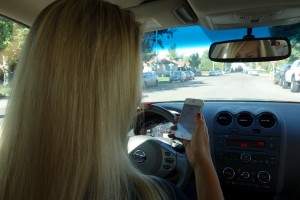
People’s increasing dependency on Global Positioning Systems and web maps to find their way may impact their internal sense of direction.
Some BYU students could be called “GPS junkies,” unwilling to start their cars without first entering their destination’s address. They rely on their smartphones to lead them, guide them and walk beside them. However, depending on a GPS may be detrimental to the brain’s natural navigation processes.
“You definitely get out of practice,” said BYU behavioral neuroscience professor Brock Kirwan.
Having technology tell people where to go is a comfort factor, said Harrison Pusey, a junior majoring in information technology. However, he admitted he rarely uses GPS.
“It takes away the memory of learning how to get somewhere,” he said. “While it can increase efficiency, you become dependent on something that that you could easily lose, break or let the battery die.”
The human brain navigates in two ways. The first way uses landmarks and visual cues to create mental maps without a GPS in what is called spatial navigation. The second strategy is like being on autopilot and involves selecting the most efficient route through repetition. This latter method is similar to how GPS users navigate.
Using spatial navigation increases activity level in the hippocampus, where memory and navigation processes occur, according to research from McGill University. Conversely, excessive use of GPS technology may negatively affect parts of the brain, particularly the hippocampus.
BYU students don’t need to panic and chuck their smartphones out the window. GPS technology also benefits the mind.
The human brain’s capacity is limited and can fill up like a hard drive, said BYU behavioral neuroscience professor Brock Kirwan. With GPS technology, the brain doesn’t have to remember how to get from point A to point B. This enables people to leave room in their brains for other information.
“With any new technology, people come to rely on it, and I think that’s kind of a good thing,” Kirwan said. “Your memory is not infinite. There are only so many synapses in your brain.”
Additionally, GPS and web mapping positively impact the way people explore their surroundings. Hiking and outdoor activities have improved because people can more easily orient themselves, said BYU’s geography department chair, Ryan Jensen.
This technology enables people to connect and explore by notifying them of what is in their vicinity. Apps such as Yelp or Urbanspoon use this idea to help people discover new businesses nearby.
“I don’t know if our sense of direction is getting better or worse,” Jensen said. “But it is changing how we do things.”




